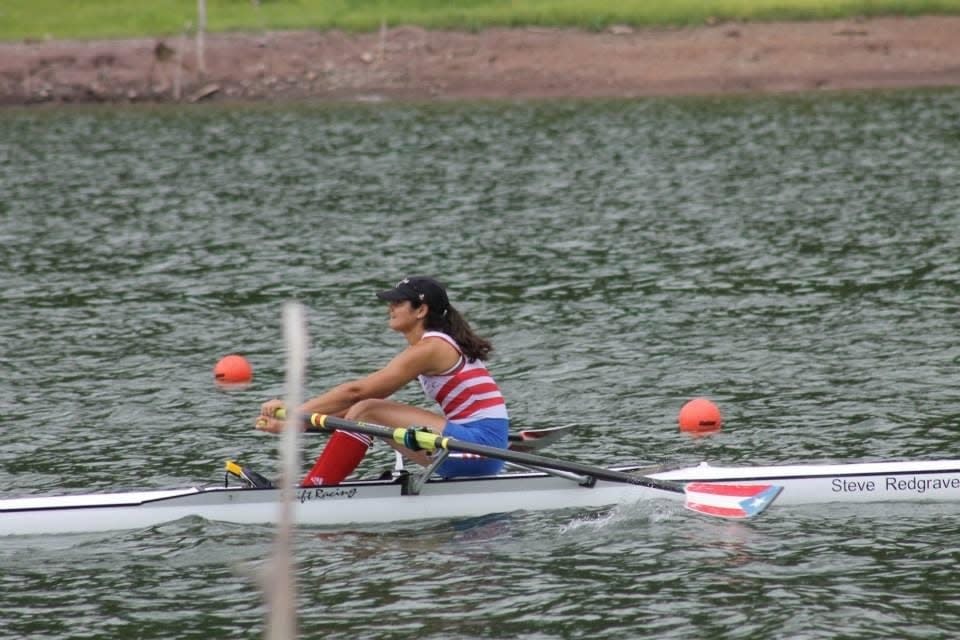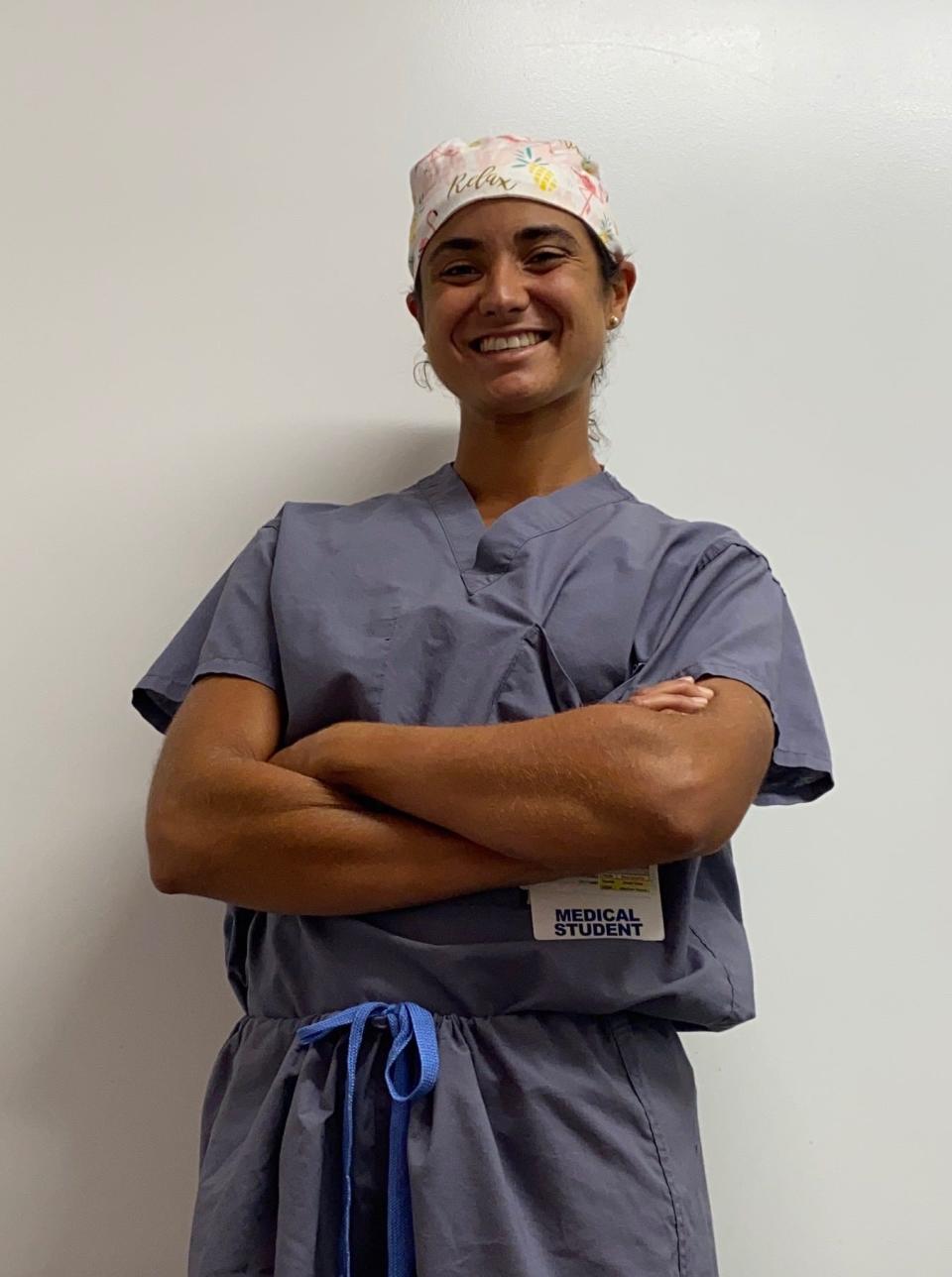How a Stanford med student became Puerto Rico's first female rower in Tokyo Olympics
Nearly 20 years before Veronica Toro Arana became Puerto Rico’s first woman rower to compete at the Olympics, she stepped to the plate on an all-boys Little League baseball team as a 6-year-old.
Bored in the bleachers, she concluded that if she was going to have to watch her younger brother Sebastian play ball, she ought to pick up a glove and join the team, too. The year before, Toro Arana saw a lone girl play on a different team. She knew it could be done. So, her father Pedro signed her up to play.
“I was taller than all the dudes,” Toro Arana said. “They were probably intimidated.”
Growing up in San Juan, on the baseball field or in the classroom, Toro Arana approached all challenges with fearlessness and determination. It’s that same attitude that propelled her to the pinnacle of Puerto Rican rowing, through the pre-medical track at the Massachusetts Institute of Technology and to medical school at Stanford. Now, she’ll become the first Puerto Rican rower, male or female, to compete in an Olympics in 33 years. Rowing heats begin Friday in Tokyo.

“It's kind of a thing where rowing picked me, I didn't necessarily pick rowing,” Toro Arana said. “It was just the thing that I ended up doing and then I ended up really liking it, so I stuck with it. Even more so after I learned about the possibility of representing Puerto Rico doing it.”
How she found the Puerto Rican national team
Toro Arana, who wouldn’t describe herself as a “natural athlete,” never dreamed of becoming an Olympian as a child. Well, not an Olympic athlete, to be specific – she participated in Math Olympics in school. But from baseball to ballet to volleyball, Toro Arana dabbled in a bit of everything competitive.
That curiosity never faltered, even when Toro Arana arrived at MIT. At 5-foot-10, she didn’t think she’d be tall enough to play club volleyball in the front row as she did in high school. A lover of water who grew up on an island, Toro Arana decided she would try sailing, but she got shut out of the class at MIT’s pre-orientation summer program. A teaching assistant suggested the lanky freshman try rowing instead.
NEVER MISS A MEDAL: Sign up for our Olympic newsletter now
WANT BEHIND-THE-SCENES ACCESS IN TOKYO?: Sign up for Olympic texts to get exclusive access to the Games
“I remember sitting on the boat for the first time and realizing that you actually row backwards,” Toro Arana said. “I don't think I got that impression when I was doing the whole rowing machine (indoors). So I was like, OK. We go backwards.”
Toro Arana joined the lightweight team, which requires women to weigh 130 pounds or less. In her first semester, she demonstrated that she had the raw power necessary to be a successful rower by pulling fast times on the ergometer, the indoor rowing machine.
When she returned home for his first winter break, her father found an article about how the Puerto Rico Rowing Federation sought to add new rowers. Toro Arana reached out and showed up to Laguna de Condado in San Juan, a small lagoon roughly one kilometer long, where the team of mostly men trained. The coach placed her in a double the first day and a single the second day even though she never sculled with two oars before. Rowing the eight at MIT, she only learned how to sweep with one.
Regardless, Toro Arana was determined to learn how to scull. But in the beginning of her experience, she said she felt like she wasn’t being taken as seriously as her male counterparts were.
“I think (the coach) just didn't know what to do with me,” Toro Arana said. “Because I hadn't been training with him for long. But I think after a while, when we did all the workouts together and most of the time, I was probably taking things more seriously than the guys that were there, he just treated me like one of the guys.”
While training in Puerto Rico over the summer, Toro Arana was encouraged to switch to the open weight team. Changing categories would allow her to have more opportunities to represent Puerto Rico in the single internationally, including the Olympics.
Initially nervous to change weight classes, Toro Arana put her pride aside and took the leap during her second year at MIT. She found that competing against bigger and faster rowers motivated her to row harder and grow stronger.
“Even though I didn't really know what I was doing,” Toro Arana said. “I think physically because I had been training with the Puerto Rico national team and they were all guys, I was physically in (a) better position.”
Deciding to postpone medical school
Changing to the open weight category and focusing on her technique in the single presented opportunities for Toro Arana to race internationally for Puerto Rico. But with the opportunities came challenges. For the first four years, Toro Arana traveled to international competitions without a coach. She oversaw her own logistics – she learned how to rig her boat alone and sought help from others with tasks she couldn’t do by herself.
Because the Puerto Rican Rowing Federation didn’t have much experience sending its rowers to compete internationally, Toro Arana said she raced in her first World Rowing Championships when she was just 19. When she should’ve been sent to the under-23 event, she instead lined up against older, more experienced rowers.
“I do have a strong personality, but I feel like that's part of the reason I was able to do this because I don't think any 19-year-old goes by themselves to a competition and gets their way around it,” Toro Arana said.

Four years after her first international competition, Toro Arana sought to find her own coach who could help her reach the Olympics. She decided to postpone medical school and her dream of becoming a pediatric cardiothoracic surgeon for two years at the recommendation of U.S. rower, Olympic silver medalist and physician Gevvie Stone. She reached out to Francisco Viacava of Miami RowHouse, who represented Peru at the 1984 Olympics and has coached rowers from the U.S., South America and Europe.
Together, they began a complete cycle of training to put Toro Arana in a position to qualify for the Olympics. That meant starting from scratch to reverse certain habits that Toro Arana had developed without consistent coaching, according to Viacava. He put Toro Arana in a coastal boat designed for rowing on the ocean, which is wider and more stable than a standard racing shell. In the coastal boat, Viacava helped Toro Arana perfect her stroke without the risk of her falling into the water.
“If you look to the videos of three years and a half ago and now, she doesn't even recognize herself,” Viacava said. “We worked a lot on her strength. So, she is mush stronger now. Much stronger physically, much stronger mentally and also (improved) with the technical aspect of the boat. And strategy. We did mega-changes in her rowing.”
In March 2020, Toro Arana was gearing up for her Olympic qualifier in early April when the COVID-19 pandemic put a halt to her plans. First, her qualifier was canceled and then the Olympics were postponed shortly after. Toro Arana had to decide if she was going to keep training for an additional year while continuing to delay the completion of her medical degree.
“We were in the middle of a pandemic and I had the potential to be a doctor,” Toro Arana said. “At this point, I had taken two years away from med school already almost and the people I started med school with were gonna graduate and were gonna be able to help in the pandemic. And here was I, just rowing in this ultimately kind of selfish pursuit, you know?
“Because yeah, I'm representing Puerto Rico and whatnot, but when you're an elite athlete, a lot of it is super selfish. You've got to focus on your training, your eating, your sleeping, all of it takes over your life.”
When Toro Arana learned that she could do three of her rotations remotely for three months, she decided to stay in Miami to train while attending classes online. Upon completion, she flew to California to do three months of in-person rotations at Stanford. For the first month and a half, she woke up at 4 a.m. to train before going to the hospital at 6 a.m. But once she reached the surgery rotation, she struggled to squeeze in her workouts during 12-to-16-hour days.
Toro Arana returned to Miami in late September 2020 and prepared full-time for the Americas qualification regatta in March. Shortly after she arrived in Rio de Janeiro, Brazil, she found out that the competition was shortened from three days to two due to new COVID-19-restrictions. Despite the stress, Toro Arana placed fifth in the final, earning her a spot on the Puerto Rican Olympic team.
“When she did it, she started crying because there were no other Puerto Rican females qualified to the Olympics (in rowing),” Viacava said. “I knew it was important for her, but I didn't know how deep in her heart (it) was.”
After training in Sabaudia, Italy with Viacava and Peruvian rower Alvaro Torres for a month, Toro Arana headed to Tokyo looking forward to putting up a fight in the single. Just like when she saw another girl play Little League baseball years ago, she hopes she can set an example for Puerto Rican girls and women interested in trying rowing.
Toro Arana said she is working on submitting a proposal to the government that would rehabilitate a park damaged by Hurricane Maria in 2017 and establish an ideal location for rowing on the island. By making water sports more accessible in Puerto Rico, Toro Arana said the nation can develop more homegrown talent. She regularly keeps tabs on the up-and-coming women in the Puerto Rican rowing community.
One day, she aspires to compete internationally for Puerto Rico with a partner in the boat.
“I think that's a way for me to start it, to be directly involved in how it continues,” Toro Arana said. “If I row with someone else and I motivate someone else to do it, they don't have to do it by themselves.”
This article originally appeared on USA TODAY: 2021 Olympics brings Stanford med student to row for Puerto Rico

